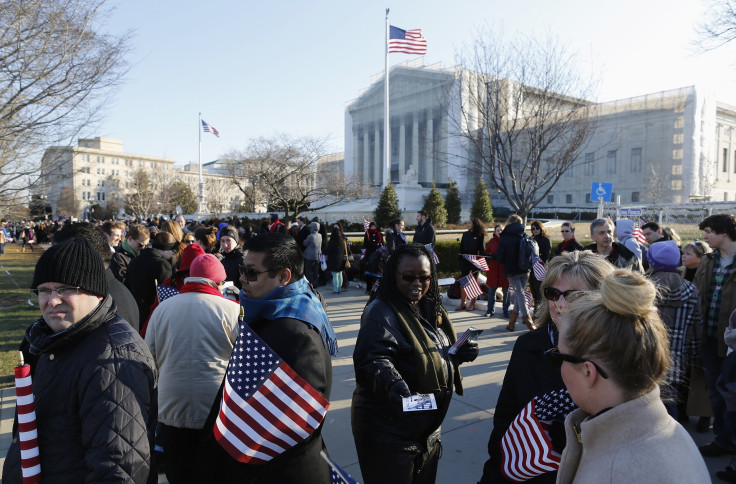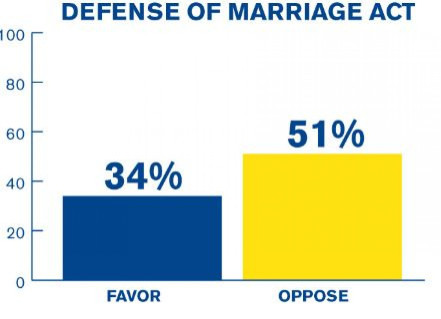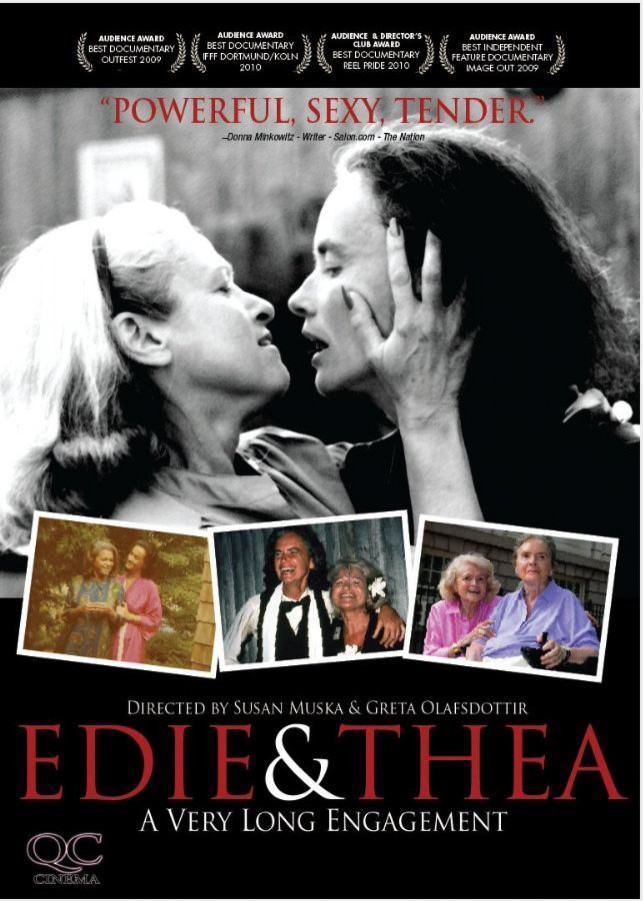Gay Marriage: Supreme Court Seems Poised To Strike Down DOMA

2 p.m. The Supreme Court's website has released a full transcript of Wednesday's oral arguments, available below. Audio of the arguments is available here.
12:12 p.m. Despite spending almost an hour debating whether the Supreme Court has the jurisdiction to rule on DOMA, reports indicate the justices are far more likely to come to a decision in the case than with Proposition 8. And all reports indicate the nation's high court is unlikely to uphold its constitutionality.
A first report from SCOTUSblog predicts the court is “80% likely" to strike down the federal marriage ban. Kennedy has reportedly suggested the law violates states’ rights, while the four liberal judges saw it as a violation of gays and lesbians’ civil rights.
Final update: #scotus 80% likely to strike down #doma. J Kennedy suggests it violates states’ rights; 4 other Justices see as gay rights.
— SCOTUSblog (@SCOTUSblog) March 27, 2013
Kennedy pointed out that a federal that doesn’t recognize gay marriages that are legal in some states can create serious conflicts, according to an early report from Bloomberg News. However, he apparently did not completely dismiss the idea that the federal government at times needs to use its own definition of marriage, such as for taxation purposes.
Justice Ruth Bader Ginsburg wasn’t buying it, questioning the validity of only partially recognizing a couple’s union in certain jurisdictions by asking, “One might well ask, what kind of marriage is this?”
11:55 a.m. Reports from inside the courtroom suggest the conservative justices are not pleased by how the Obama administration claims DOMA is unconstitutional, but refused to defend that assertion in court. From The Wall Street Journal:
“Chief Justice Roberts repeatedly expressed irritation at the Obama administration, telling Ms. Jackson, the court-appointed lawyer, and without specifically mentioning the administration, that perhaps the government should have the 'courage' to execute the law based on the constitutionality rather instead of shifting the responsibility to the Supreme Court to make a decision.”
Meanwhile, SCOTUSblog reports Kennedy has been asking questions casting doubt on the validity of DOMA:
Update: J Kennedy asks two questions doubting #doma validity but nothing decisive and Chief Justice and Kagan have yet to speak.
— SCOTUSblog (@SCOTUSblog) March 27, 2013
11:40 a.m. Several polls show that, while support for marriage equality continues to rise, at least a third of Americans still favor DOMA.
A plurality of voters said they believed DOMA was a bad law in a December 2012 HuffPost/YouGov poll, although the numbers were still divided -- 43 percent said DOMA is, literally, a "bad law," while 34 percent said it was a "good law." A significant 23 percent said they weren't sure.
Similar numbers were reported in a 2011 poll from the Human Rights Campaign:

11:30 a.m. Chief Justice John Roberts is seriously questioning why DOMA is before the Supreme Court, according to The Wall Street Journal. He reportedly told Sri Srinivasan, the principal deputy solicitor general, that he does not quite understand why the federal government agreed with a lower court ruling finding DOMA unconstitutional, but is still seeking input from the nation’s high court.
11:20 a.m. DOMA is widely seen as an easier case than the broader challenge the court faced with Proposition 8. That’s particularly true for Kennedy, who on Tuesday said he was wary of prohibiting states from enacting their own individual bans on same-sex marriage.
If the Supreme Court ultimately strikes down DOMA, each state would still have the ability to create their laws regarding gay marriage. However, the federal government would not be able to withhold federal benefits from gay and lesbian married couples residing in states that recognize their union.
Lawyers from the House Bipartisan Legal Advisory Group, or BLAG, have stepped up to defend DOMA in court. According to SCOTUSblog, BLAG rejected a previous ruling stating that court’s should review the law using “heightened scrutiny” -- a standard used in cases dealing with sex discrimination -- because it does not believe gays and lesbians have actually been the victims of discrimination.
“To the contrary, BLAG suggests, gays and lesbians are ‘one of the most influential, best-connected, and best-organized groups in modern politics, and have attained more legislative victories, political power, and popular favor in less time than virtually any other group in American history’ – as reflected in the fall 2012 elections and the fact that they have the support of both President Obama and Attorney General Holder in this case. But even if the Court did apply ‘heightened scrutiny,’ BLAG goes on to say, DOMA would still be constitutional because governments have an important interest in being able to address ‘an issue as divisive and fast-moving as same-sex marriage for itself,'" SCOTUSblog writes.
BLAG also argues that DOMA does not infringe on state's rights, because all the law does is define marriage for federal purposes, but does not prevent states from defining marriage as they choose.
10:55 a.m. SCOTUSblog reports it is unclear whether a majority of justices even believe the Supreme Court has the power to decide the case, a reminder of the jurisdiction questions surrounding Tuesday's Proposition 8 case.
#doma jurisdiction argument continues with no clear indication of whether a majority believes #scotus has the power to decide the case.
- SCOTUSblog (@SCOTUSblog) March 27, 2013
10:45 a.m. DOMA adds about $500 million to the federal deficit each year, according to a 2004 estimate from the Congressional Budget Office. While a comparatively small amount, striking down the law could still save more than ending subsidies to PBS -- a suggestion famously introduced by Mitt Romney during the 2012 Republican presidential primaries.
Tax revenues would reportedly rise by more than $400 million a year if DOMA is truck down, Bloomberg News reports. Costs for social safety net programs like Medicare and Medicaid would go down, although the costs for federal benefits programs like Social Security would likely increase.
Same-sex couples currently are not allowed to file joint income taxes, which prevents them from claiming some tax exemptions for spouses and dependents. Those couples are not eligible for spousal health, Social Security or federal pension benefits either, one of the reasons older LGBT couples are considerably more likely to live in poverty than elderly heterosexuals.
The U.S. Supreme Court has reconvened to hear a challenge to the Defense of Marriage Act, or DOMA, on Wednesday, the second day of proceedings devoted to measures that prohibit recognition of gay and lesbian marriages.
Tuesday’s arguments surrounding the legality of Proposition 8, a California law struck down by a lower court, demonstrated how divided the justices are over how far the rights of gay and lesbians should extend. Some, particularly Justice Anthony Kennedy -- generally considered the court’s swing vote -- even suggested the nation’s high court should dismiss the case without a decision.
Wednesday’s case, United States v. Windsor, challenges the constitutionality of DOMA. However, it doesn’t specifically address a possible constitutional right to same-sex marriage itself -- rather, it questions whether Congress can pass a law that treats gay married couples differently from heterosexual couples.
The lawsuit centers on Edith Windsor, an elderly New York woman whose longtime partner -- and, eventually wife -- Thea Spyer died in 2009. At the time, New York was recognizing legal same-sex marriage performed in other jurisdictions. However, after Spyer’s death Windsor was forced to pay more than $360,000 in federal estate taxes on her wife’s inheritance -- a heterosexual widow would have paid no taxes.
Two lower courts have already ruled that DOMA’s definition of “marriage” as solely a legal woman between a man and a woman is unconstitutional.
Oral arguments begin at 10 a.m. The court will release audio recordings of the proceedings at 2 p.m.
Below, a poster for a documentary about the couple.

© Copyright IBTimes 2025. All rights reserved.




















